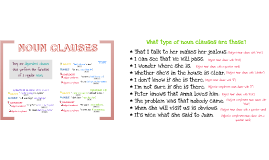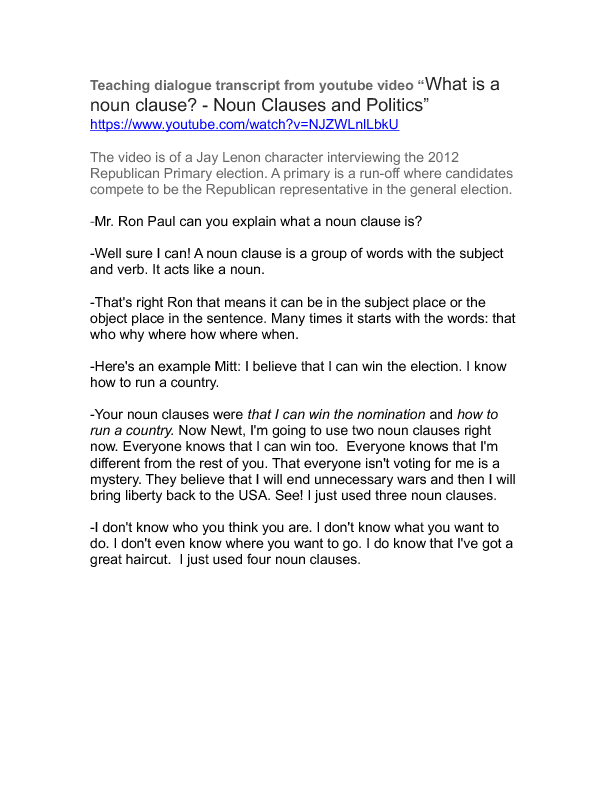What Is Noun Clause - Clauses Identifying Adjective Adverb And Noun Clauses In / A noun clause is a dependent clause that acts as a noun.. We have also seen that a noun clause is a subordinate clause which does the work of a noun in a complex sentence. Nouns can function as subjects, direct objects, indirect objects, object of the preposition, and predicate nominatives. Noun clauses are clauses that function as nouns. Since it is a dependent clause, it cannot stand alone as a sentence. What is a noun clause?
I like what i see. It can be the subject of a sentence, an object, or a complement. What is a noun clause? Noun phrases generally begin with words such as how, that, what, whatever, when, where, whether, which, whichever, who, whoever, whom, whomever, and why. In the noun clause you said is a subject plus a verb.

A noun clause can be used as a subject or a specific object of a verb, as a noun, as an adjective, or as an adverb.
Conjunctions are words that link words, phrases, and clauses. Remember that a noun names a person, place, thing, or idea. Some examples of nouns include, man, house, and car. Replace a noun clause with a pronoun or a noun to check if it is actually a noun clause. Noun phrases generally begin with words such as how, that, what, whatever, when, where, whether, which, whichever, who, whoever, whom, whomever, and why. For example (noun clauses shaded): A noun clause is a type of dependent clause that is able to function grammatically like a noun in a sentence. A noun clause has to do with the beta clause, which we also call a dependent or subordinate clause which performs the function of a noun in a sentence or functions like the nominal group. Nouns can function as subjects, direct objects, indirect objects, object of the preposition, and predicate nominatives. We'll explore them acting as subjects, direct objects, objects of the preposition, and predicate nouns. The noun clause functions in the same way as a noun or pronoun, establishing a subject or object in the sentence. The noun clause is a clause that functions like a noun in the sentence. Some grammars use the term nominal clause for noun clauses.
A noun clause is a dependent (or subordinate clause) that works as a noun. As such, it serves to name a person, place, or thing. A noun clause has to do with the beta clause, which we also call a dependent or subordinate clause which performs the function of a noun in a sentence or functions like the nominal group. For example (noun clauses shaded): We'll explore them acting as subjects, direct objects, objects of the preposition, and predicate nouns.

Essentially, a noun clause is a phrase or part of a sentence that acts as a noun.
A noun clause is a dependent (or subordinate clause) that works as a noun. It must always be paired with an independent (main) clause. A dependent clause is a. A noun is generally accepted to be a person, a place, or a thing. What's more, a verb is a word that describes an action while a subject is a person or thing performing the action. It can be the subject of a sentence, an object, or a complement. A noun clause is a clause that plays the role of a noun. Noun clauses begin with words such as how, that, what, whatever, when, where, whether, which, whichever, who, whoever, whom, whomever, and why. Noun clauses generally begin with words such as how, that, what, whatever, when, where, whether, which, whichever, who, whoever, whom, whomever, and why. Some examples of nouns include, man, house, and car. A noun clause functions as noun in a sentence. In spanish, you call them cláusulas nominales or cláusulas sustantivas. Replace a noun clause with a pronoun or a noun to check if it is actually a noun clause.
What is a noun clause? This is only true if 'that' is used to introduce a noun clause in the middle or at the end of the sentence. A dependent clause is a. Noun clauses are clauses that function as nouns. Moreover, a clause is defined as a unit of grammar that contains at least one verb and a subject.

This is only true if 'that' is used to introduce a noun clause in the middle or at the end of the sentence.
There are instances wherein we would like to name something but a lone word would not suffice, and that is when we need a noun clause, which is composed of a group of words, in order to name something. Noun clauses generally begin with words such as how, that, what, whatever, when, where, whether, which, whichever, who, whoever, whom, whomever, and why. A noun is the name of a person, place, thing, or idea. What is a noun clause? Noun phrases generally begin with words such as how, that, what, whatever, when, where, whether, which, whichever, who, whoever, whom, whomever, and why. Moreover, a clause is defined as a unit of grammar that contains at least one verb and a subject. A noun is a part of speech that names a person, place, or thing. Noun clause as the object of a verb. A noun clause is a dependent clause that contains a subject and a verb. The noun clause functions in the same way as a noun or pronoun, establishing a subject or object in the sentence. A noun clause is a dependent clause that functions as a noun. It is usually included in formal writing (as in the first example): A clause is a group of words containing a subject and a verb.

Posting Komentar
0 Komentar